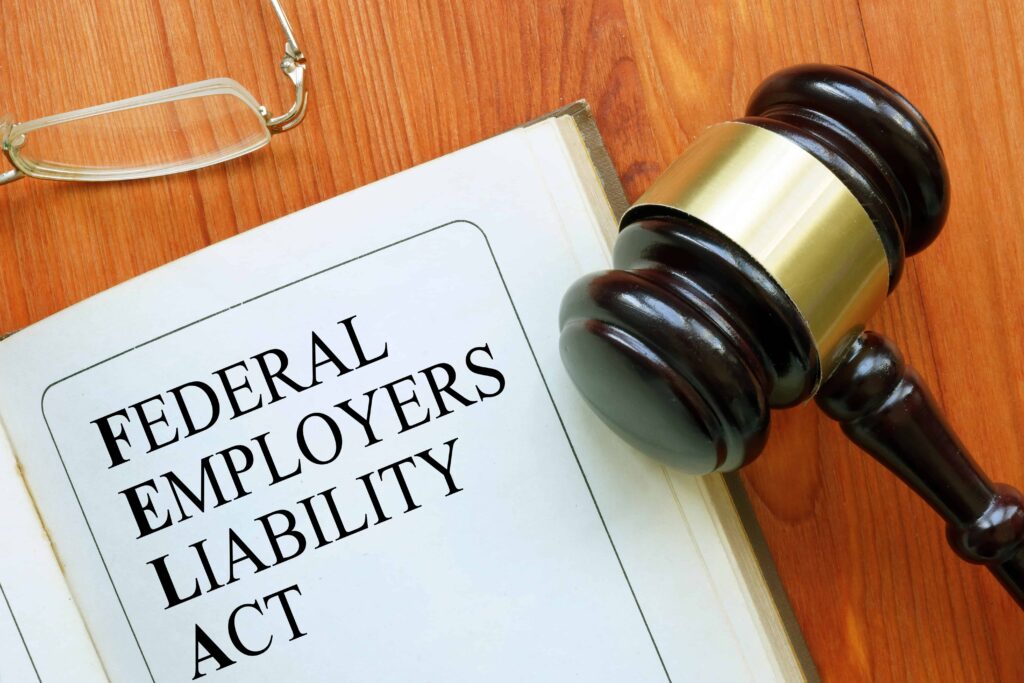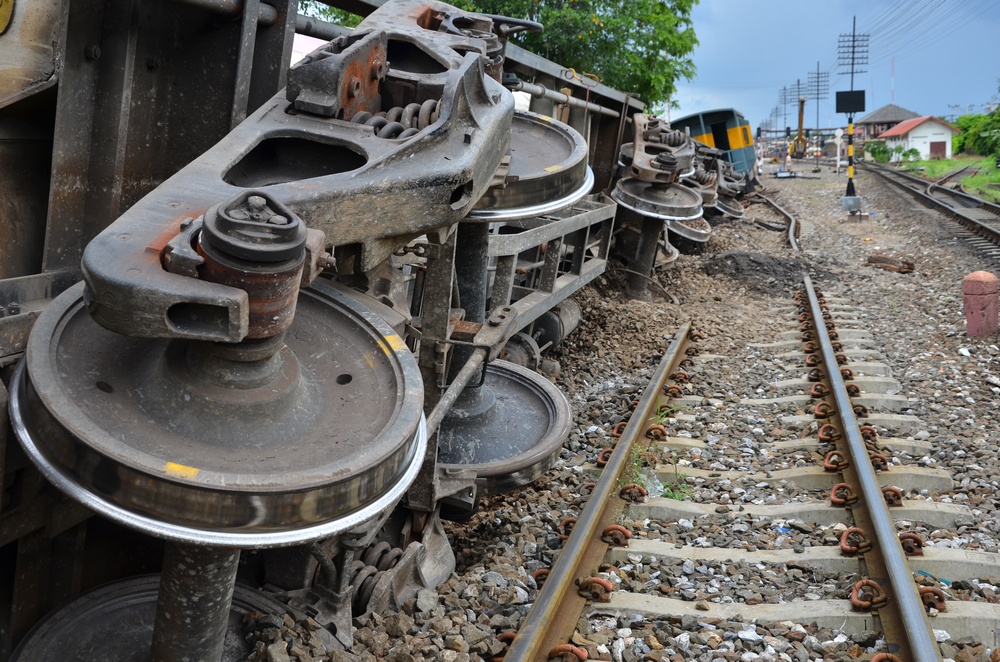As a railroad employee, you probably wonder… if I’m injured in a railroad accident, who can I sue? Let’s look at who you can hold accountable for your injuries and financial losses. The answer often lies with your employer, the railroad company itself.
Unlike most workers, railroad employees are typically not covered by state workers’ compensation laws. Instead, your rights are protected by a powerful federal law called the Federal Employers’ Liability Act (FELA). This unique legal framework allows injured railroad workers to sue their employer directly for negligence, opening the door to full compensation that goes far beyond what traditional workers’ comp offers.
To begin, we’ll review what FELA means for your claim, who can be held responsible, the types of damages you can seek, and how an experienced railroad worker lawyer can help you navigate this unique area of law.
Contact Hach & Rose Today for a Free Consultation
What is The Federal Employers’ Liability Act (FELA)?

For over a century, FELA has stood as the cornerstone of railroad worker safety and compensation. Enacted in 1908, this federal law was created specifically to protect railroad employees who are injured or become ill due to their employer’s negligence. It acknowledges the inherent dangers of railroad work and provides a way for injured workers to seek justice.
How FELA is Different from Workers’ Compensation
The most significant distinction for railroad workers is that FELA operates differently from state-based workers’ compensation systems.
- Negligence Requirement: Under FELA, you must prove that the railroad’s negligence played some role in causing your injury, no matter how slight. This differs from workers’ compensation, which is a “no-fault” system.
- Broader Damages: While workers’ comp often provides only medical expenses and a portion of lost wages, a successful FELA claim allows compensation for a much wider range of damages, including pain and suffering, future lost earnings, and loss of enjoyment of life.
- Right to a Jury Trial: FELA grants injured railroad workers the right to file a lawsuit directly in state or federal court and to have their case heard by a jury, a critical option typically unavailable under workers’ compensation.
- Contributory Negligence: FELA accounts for situations where a worker might be partially at fault. Your damage award can be reduced by your percentage of fault, but the railroad’s responsibility for safety remains paramount. In some cases, if the railroad violated a federal safety law (like the Safety Appliance Act), there may be no reduction for contributory negligence.
- Protection Against Retaliation: FELA, along with the Federal Railroad Safety Act (FRSA), includes strong whistleblower protections, making it illegal for railroads to intimidate or retaliate against employees who report injuries, safety concerns, or cooperate with an investigation.
Under FELA, if you’re a railroad worker, your injury claim isn’t just about getting basic benefits; it’s about holding your employer accountable for a safe workplace.
Who Can Be Held Responsible Under FELA?
Under FELA, the primary entity you can sue is your employer, the railroad carrier. This applies if your injury or illness resulted from the negligence of:
- The Railroad Itself: This covers the company’s policies, procedures, maintenance practices, and overall safety culture.
- Any of its Officers, Agents, or Employees: Even if another railroad worker, supervisor, or agent of the company was negligent, that negligence is attributed to the railroad employer.
- A Defect or Insufficiency Due to Its Negligence: This covers unsafe working conditions or defective equipment if the railroad was negligent in providing or maintaining it.
This broad scope means that even seemingly minor acts of negligence by the railroad or its personnel can be sufficient to establish liability under FELA. The law’s intent is to create a strong incentive for railroads to prioritize safety.
Common Types of Railroad Accidents and Injuries

Railroad work is inherently strenuous and often dangerous, leading to a wide array of accidents and injuries. According to the Bureau of Labor Statistics, the fatality rate for railroad workers is significantly higher than for the average American employee, with thousands of non-fatal injuries occurring annually. Let’s review some common scenarios that might give rise to a legal claim:
Accidents Unique to Railroad Operations
-
- Derailments: These are among the most common and catastrophic railroad accidents. They can occur due to track defects, excessive speed, switch malfunctions, or improperly loaded freight cars. Derailments can lead to severe crushing injuries, impalement, or death.
- Collisions: Trains can collide with other trains, vehicles at crossings, or objects on the tracks. These incidents often cause severe blunt force trauma, spinal injuries, or wrongful death.
- Hard Couplings: Improperly coupling railcars can cause sudden, violent impacts, leading to back, neck, and joint injuries from the force.
- Slips, Trips, and Falls: Working on uneven ballast, slippery platforms, or in poorly lit rail yards can lead to falls from height (e.g., from train cars or ladders) or slips on hazardous surfaces.
- Manual Work in Train Yards: Activities like throwing switches, adjusting couplers, or inspecting cars involve heavy manual labor, increasing the risk of sprains, strains, and repetitive stress injuries.
- Company Vehicle Accidents: Railroad employees often drive company vehicles to and from work sites or within rail yards, leading to standard vehicle accidents with unique on-property circumstances.
- Electrical Accidents: Contact with live wires, third rails, or faulty electrical equipment can result in severe electrocution or burns.
Common Injuries Suffered by Railroad Workers
Railroad workers often sustain injuries ranging from acute trauma to chronic occupational illnesses, including:
- Musculoskeletal Injuries: Back, neck, shoulder, and knee injuries are extremely common due to heavy lifting, repetitive motions, and working in awkward positions. These can include herniated discs, spinal fractures, and severe sprains.
- Traumatic Brain Injuries (TBI): Falls, being struck by falling objects or equipment, or blunt force trauma from collisions can cause concussions to severe TBIs, leading to lasting cognitive, emotional, and physical impairments.
- Amputations and Crush Injuries: Being caught between cars, under rolling stock, or crushed by equipment can result in severe limb trauma requiring amputation.
- Hearing Loss: Constant exposure to loud noises from trains, horns, and machinery often leads to permanent hearing damage or tinnitus.
- Toxic Exposure and Occupational Diseases: Railroad workers may be exposed to hazardous chemicals, diesel exhaust, asbestos, solvents, or other substances, leading to respiratory illnesses, various cancers (such as mesothelioma or lung cancer), or other chronic conditions.
- Burns and Electrocution: Contact with live wires, steam, or hot equipment can cause severe burns.
- Psychological Trauma: Witnessing or being involved in severe accidents can lead to post-traumatic stress disorder (PTSD), anxiety, and depression.
- Wrongful Death: Tragically, severe railroad accidents can cause fatalities, allowing surviving families to pursue FELA wrongful death claims.
Proving Railroad Negligence Under FELA
To succeed in a FELA claim, your injury lawyer must demonstrate that the railroad’s negligence, however slight, contributed to your injury. This “slightest negligence” standard is more favorable to the injured worker than typical personal injury cases. Negligence can occur in various ways:
- Unsafe Working Conditions: This is a broad category that covers inadequate lighting in yards, uneven ballast, slippery surfaces, cluttered walkways, and insufficient clearance between tracks and structures.
- Defective Equipment: Your employer may fail to provide safe tools, machinery, locomotives, railcars, or safety devices. This includes broken parts, poor maintenance, or design flaws.
- Improper Training or Supervision: The railroad’s failure to adequately train workers on safety procedures and equipment operation or to supervise tasks properly can lead to accidents.
- Violation of Safety Regulations: If the railroad fails to comply with federal railroad safety laws, such as the Safety Appliance Act, Locomotive Inspection Act, or Federal Railroad Safety Act (FRSA), or OSHA regulations.
- Fatigue or Understaffing: Requiring employees to work excessive hours, leading to fatigue and impaired judgment, or failing to provide enough staff to safely complete tasks.
- Failure to Warn: Not providing adequate warnings about hazards, train movements, or unsafe conditions.
Building a strong FELA case requires a thorough investigation into railroad practices, safety records, inspection logs, and employee conduct.
What Damages Can You Recover in a FELA Claim?

One of the significant advantages of FELA over workers’ compensation is the broader range of damages available to injured railroad workers. A successful FELA claim seeks compensation for both direct financial losses and the broader impacts of the injury or illness.
Economic Damages: Quantifiable Financial Losses
- Past and Future Lost Wages and Benefits: Compensation for all income, including regular wages, overtime, and bonuses, lost from the time of injury through projected retirement. This also covers the value of lost benefits like health insurance, retirement contributions, and pension accruals.
- Past and Future Medical Expenses: Covers all medical treatment, including emergency care, surgeries, hospital stays, doctor visits, prescription medications, rehabilitation, physical therapy, assistive devices (such as wheelchairs, prosthetics), and long-term care needs.
- Loss of Earning Capacity: If your injury permanently limits your ability to perform your previous job or to earn at the same level in the future, FELA allows recovery for this diminished capacity.
- Replacement Services: Costs for household services you can no longer perform, such as cleaning, cooking, or yard work.
- Vocational Rehabilitation: Expenses for retraining or education if your injury necessitates a career change.
Non-Economic Damages: Intangible Losses
- Pain and Suffering: Compensation for the physical pain, discomfort, and emotional anguish experienced as a direct result of your injury. This is often a significant component of a FELA claim.
- Emotional Distress and Mental Anguish: This includes compensation for psychological trauma, anxiety, depression, PTSD, and other mental health impacts stemming from the accident or your injury.
- Loss of Enjoyment of Life: Damages for how your injury has diminished your ability to engage in daily activities, hobbies, recreational pursuits, and overall quality of life.
- Permanent Disability or Disfigurement: Compensation for lasting physical impairments, scarring, or disfigurement that impacts your appearance, mobility, or self-esteem.
In cases of wrongful death, the surviving spouse and family members can recover for monetary losses ( lost financial support, lost inheritance) as well as for the deceased’s pain and suffering prior to death, and loss of aid, comfort, and counseling.
Steps to Take After a Railroad Accident
After a railroad accident, your actions can significantly influence the strength of your FELA claim.
- Report the Injury Immediately: Notify your supervisor of the accident and injury as soon as possible. Insist on a formal accident report and obtain a copy.
- Seek Medical Attention Promptly: Your health is paramount. Get evaluated by medical professionals without delay. Follow all medical advice and keep detailed records of all treatments and diagnoses.
- Document Everything: Take photos of the accident scene, any hazardous conditions, defective equipment, and your visible injuries. Gather contact information for witnesses. Keep a journal detailing your pain, limitations, and how the injury affects your daily life.
- Do Not Give Recorded Statements: The railroad’s insurance claims agents are not looking out for your best interests. Do not give any recorded statements, sign any documents (especially medical releases), or accept any settlement offers without first consulting an experienced FELA attorney.
- Avoid Social Media Discussions: Refrain from posting about your accident, injuries, or recovery on social media. These posts can damage your claim.
- Contact a FELA Attorney Immediately: The complexities of FELA, the railroad’s legal resources, and the strict statute of limitations, which is generally three years from the date you knew or should have known about your injury, make immediate legal counsel essential.
Why You Need an Experienced FELA Attorney

FELA cases are complicated and differ significantly from standard personal injury or workers’ compensation claims. Railroad companies have vast legal teams and resources dedicated to minimizing their liability. An experienced FELA attorney understands the unique federal laws, regulations, and industry practices involved. They know how to:
- Investigate Thoroughly: Uncover all acts of railroad negligence, no matter how slight.
- Gather Critical Evidence: Secure maintenance records, safety reports, black box data, and expert testimony.
- Fight Retaliation: Protect you from wrongful termination or disciplinary action for reporting an injury or seeking legal help.
- Negotiate Aggressively: Counter the railroad’s tactics and demand fair compensation.
- Represent You in Court: Take your case to trial if a fair settlement cannot be reached, advocating fiercely before a jury.
Attempting to handle a FELA claim alone can lead to inadequate compensation and jeopardize your future.
Trust Hach & Rose, LLP to Be Your FELA Advocates
If you are a railroad worker injured on the job, you deserve a legal team that understands the unique challenges and protections afforded to you under FELA. At Hach & Rose, LLP, we have a strong history of representing union workers and injured railroad employees, fighting to secure the full compensation and justice they deserve.
Our firm is dedicated to providing sound, honest legal representation. We bring nearly 25 years of experience and a track record of securing over one billion dollars for injured victims. We work on a contingency fee basis, so you pay nothing upfront, and we only receive legal fees if we successfully resolve your case.
Do not allow the railroad to dictate your future. Protect your rights and secure your financial stability. Contact Hach & Rose, LLP, today at (212) 779-0057 for a free and confidential consultation with an experienced FELA attorney. We are here to fight for you.